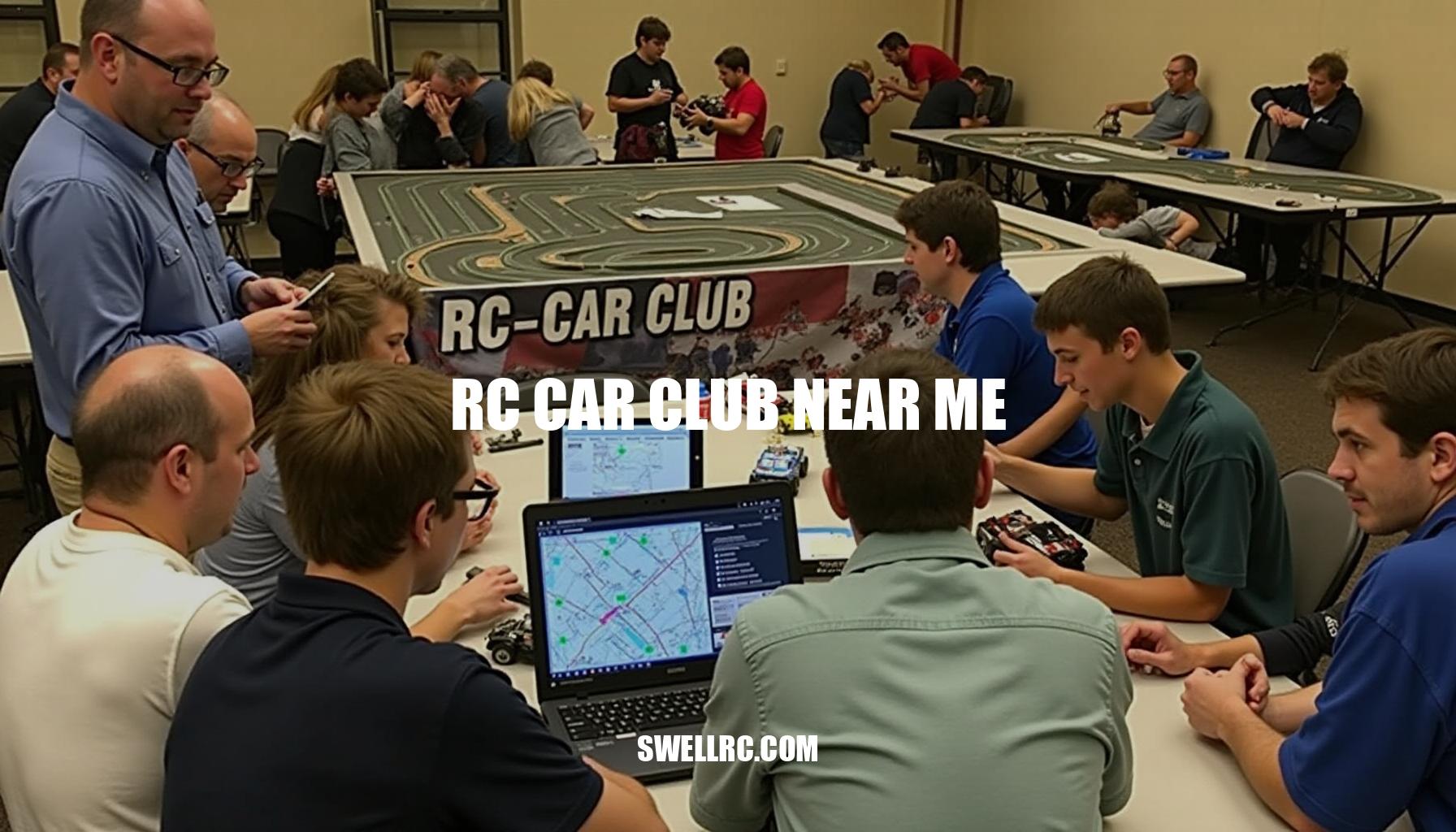Join an RC Car Club Near You: Expert Guidance & Community Connection
After countless weekends searching for my next RC adventure, I finally typed “rc car club near me” and stepped onto a dusty infield where the sound of brushless motors and laughter mixed like music. Within minutes, a veteran racer handed me a spare transponder and showed me how to line up for practice laps—proof that RC clubs are where skills grow and friendships start. Local RC hobby clubs are booming because they bundle community, mentorship, and proper facilities into one welcoming scene.
Whether you’re into cars, boats, or planes, clubs connect you to organized remote control car tracks, safe spaces, and people who love the same tinkering and competition you do. As you explore the best RC race tracks in my area, resources like rc race tracks near me and rc-tracks-near-me help you map out venues and events so you can find a home base fast within the thriving RC racing community. For every RC enthusiast, joining a club transforms a hobby into an exciting and social experience.
What Makes an RC Car Club Special
An RC car club is a volunteer-driven community that offers a rich, engaging environment for enthusiasts of all levels. These clubs organize practice days, race programs, track maintenance, skill-sharing sessions, and social hangouts, creating a vibrant hub around RC car competitions. A typical meet usually includes open practice, heat racing, and mains, with plenty of time in between for pit talk, tuning help, and tire swaps.
Clubs also manage timing systems, publish class rules, and coordinate workdays to keep facilities like indoor RC car tracks or dirt RC tracks in top shape.
The benefits of joining an RC car club are substantial: members get instant access to proper tracks, mentorship from experienced drivers, group-buy savings, and sometimes even discounts on equipment and professional RC cars, such as those featured at Swell RC’s professional RC cars. For example, when I joined my local club, my lap times dropped by two full seconds within a month thanks to setup tips and clean racecraft learned during club nights.
To help you find the best fit, here is a comparison table outlining the differences between casual and competitive RC clubs. This includes aspects such as schedule intensity, rules strictness, class structure, and the overall vibe—important factors whether you enjoy off-road RC cars or prefer the thrill of model car events.
| Feature | Casual RC Clubs | Competitive RC Clubs |
|---|---|---|
| Schedule Intensity | Flexible, occasional meets and practice days | Regular, structured sessions with frequent races |
| Rules Strictness | Relaxed, focused on fun and learning | Strict adherence to class and race regulations |
| Class Structure | Simple classes, open setups welcomed | Multiple classes with detailed technical specifications |
| Overall Vibe | Friendly, supportive, social hangouts | Competitive, skill-focused, performance-driven |
Whether you’re just looking to enjoy laid-back afternoons or you aspire to compete in high-stakes races at indoor RC car tracks or challenging dirt RC tracks, joining an RC car club offers unbeatable opportunities. From mentorship to community support, these clubs serve as a gateway to the exciting world of RC racing.
How to Find the Best RC Car Club Near You
Finding the perfect RC club to join can be a thrilling adventure, especially if you know how to find an RC car club near me that fits your style and schedule. Start by mixing online sleuthing with real-world visits: dive into social media groups, check out local hobby shop bulletin boards, and explore regional RC forums. These platforms often link to nearby remote control car tracks and upcoming events.
For example, visiting the event boards near your closest RC car race track—like Swell RC Car Race Track—and skimming recent race results can reveal how active and welcoming the scene is. To get a true sense of the vibe, consider dropping by a practice night to chat with racers and gain firsthand experience.
If you’re passionate about nitro RC car tuning or love custom builds, browsing discussions in communities centered on Hexmods RC and similar niche platforms can connect you with specialized groups often linked to local clubs, including electric RC racing leagues.
When vetting a club, keep this checklist handy to ensure the best fit:
- Location and travel time: How far will you be commuting?
- Track type: Is it carpet, clay, dirt, or asphalt?
- Classes offered: Are there beginner-friendly RC clubs and divisions?
- Membership fees and race entry costs: What’s the budget?
- Timing systems and loaner transponders: Are these provided?
- Average turnout: How many racers show up on race days?
- Coaching culture and mentorship: Do experienced members help newcomers?
- Safety rules and marshalling expectations: What protocols are in place?
- Maintenance/volunteer commitments: Does the club expect member involvement?
- Weather/rain policies: How are events affected by weather?
- Pit hours, power availability, and lighting: Is night racing possible?
When I first walked into my local club, the noise, laughter, and whir of engines instantly told me I’d found my people. Whether you’re a beginner eager to join beginner-friendly RC clubs or a seasoned racer tuned into nitro RC car tuning, following these steps will help you connect with a vibrant community ready to welcome you.
Exploring Other RC Experiences Through Clubs
Clubs open doors beyond cars, offering RC enthusiasts an incredible range of opportunities thanks to their RC versatility. Many RC hobby clubs share spaces, calendars, and members across multiple disciplines, allowing newcomers to sample more of the hobby without starting from scratch. Whether you’re interested in model car events or exploring other exciting RC avenues, these communities are a great place to start.
To help you get started, here’s a mini-guide comparing the primary RC disciplines:
| Discipline | Venues | Skills | Weather Considerations |
|---|---|---|---|
| RC Cars | Dedicated tracks, parking lots (look for the best RC race tracks in my area) | Cornering, gearing, tire choice | Variable but generally manageable |
| RC Boats | Clean lakes and ponds (rc-boat-lakes-near-me, rc-sailboat-racing-near-me) | Hull tuning, prop selection, line choice | Wind and waves matter significantly |
| RC Planes | Sanctioned AMA fields (fly rc planes near me, rc-plane-flying-near-me) | Orientation, airspace awareness, takeoff/landing discipline | Wind rules all flights |
Beyond the technical skills and fantastic venues, cross-club friendships often blossom when you attend these diverse gatherings. This interconnectedness among clubs fosters a friendly community where members support each other’s interests, leading many to discover new disciplines and lifelong hobbies. Engaging in model car events and other activities organized by these RC hobby clubs truly underscores the joy of RC versatility within the enthusiast community.
Upgrading Your RC Setup — Level Up With Your Club
Joining RC car competitions through clubs significantly accelerates your learning curve. When you’re pitting next to seasoned racers, you gain exposure to pro-level routines such as tire saucing and sanding, shock oil changes, spring rates, gear mesh, ride height, and camber adjustments. This hands-on environment clarifies what equipment do I need for RC racing by showing you the difference between a box-stock setup and a finely dialed car.
You’ll also learn why brushless systems and LiPo battery management are critical on race day, especially in electric RC racing leagues. As you advance, experimenting with purpose-built gear and class-specific rigs, like the best RC rally car 1/10, opens up mixed-surface fun and stage-style driving experiences ideal for honing your skills.
Consider quick case study:
| Name | Starting Point | Club Strategy | Progress |
|---|---|---|---|
| Maya | Casual club with a starter buggy | Borrowed correct tire compounds, learned consistent marshalling | Within six months: podium finishes in 17.5T spec class and mentoring newcomers |
Whether you prefer off-road RC cars or want to delve into nitro RC car tuning, clubs provide invaluable guidance and a community where progress is contagious. Ultimately, you level up together, mastering the nuances of competitive racing more quickly than going it alone.
Conclusion: The Rewarding World of RC Community & Connection
From your first practice lap to your first podium, joining an RC car club transforms a solo pastime into a thrilling shared adventure. RC hobby clubs offer numerous benefits, including expert guidance, access to safe and well-maintained remote control car tracks, and structured race programs that help sharpen your skills.
The benefits of joining an RC club extend beyond just racing; you’ll become part of a supportive RC racing community that encourages you to push your limits and improve. Whether you’re wondering, “do RC clubs allow beginners?” — the answer is a resounding yes! Most clubs welcome newcomers warmly, providing beginner classes and hands-on assistance.
- Gain expert advice and mentorship
- Access top-notch remote control car tracks
- Participate in organized race events
- Meet passionate enthusiasts and lifelong friends
- Learn through beginner-friendly programs
This hobby took me further than I ever expected—both literally and socially—and it all started with a simple search for “rc car club near me” and showing up. If you’re ready, pick a night, charge your packs, and go meet the crew. Ask questions, volunteer at a workday, and jump into a beginner class.
The community is waiting, and the next best lap of your RC life is just around the corner at your local remote control car tracks.
Frequently Asked Questions
- What happens at an RC car club meeting?
Most meetings revolve around practice and racing. Drivers sign in, charge batteries, and run open practice. Organizers post heat sheets, then run qualifying and mains using a timing system. Between rounds, members wrench on cars, share setup advice, and handle track prep or marshalling duties. - How do I join an RC car club near me?
Search online groups and local hobby shops, visit a practice night, and talk to the race director. Most clubs offer drop-in practice or a first-timer race entry. Expect a modest membership or day fee, a safety briefing, and agreement to follow track rules and volunteer for marshalling. - Are RC clubs suitable for beginners?
Yes. Many clubs run novice classes, offer loaner transponders, and encourage mentorship. Beginners get help with basic setup, safe driving lines, and race etiquette. Clubs value new members and typically provide a friendly on-ramp to competition. - What’s the difference between RC car racing and RC rally?
Traditional RC racing usually runs on closed circuits (on-road or off-road) with head-to-head heats. RC rally emphasizes mixed surfaces and stage-style time trials, sometimes with gates and jumps. Rally rewards consistency and control across changing traction, while circuit racing focuses on lap pace and clean passing. - How can I find indoor vs. outdoor RC tracks nearby?
Search terms like “indoor RC track + your city” and “outdoor RC track + your city,” check club pages for photos and surface descriptions, and ask locals which venues run year-round. Indoor tracks are often carpet or clay; outdoor tracks are typically dirt, clay, or asphalt. - Do local RC clubs host tournaments or events?
Absolutely. Clubs run weekly club races, points series, seasonal championships, and larger regional or charity events. Announcements appear on social pages and at the track. Volunteering at events is a great way to meet people and learn quickly. - What kind of RC cars do professionals use?
Pros use purpose-built race kits tuned for specific classes, like 1/10 2WD buggy, 1/8 nitro buggy, touring car, and short course. They pair high-quality electronics (brushless motors, programmable ESCs, LiPo packs) with class-legal tires and meticulous suspension setups for predictable, repeatable performance.



